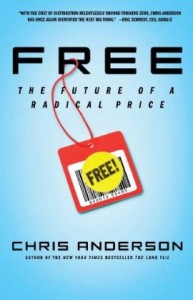 In case you haven’t yet read Free: The Future of a Radical Price, by Chris Anderson, simply do it. I will be short as the book has been extensively discussed even though it came out only one month ago.
In case you haven’t yet read Free: The Future of a Radical Price, by Chris Anderson, simply do it. I will be short as the book has been extensively discussed even though it came out only one month ago.
“With the cost of distribution relentlessly driving toward zero, Chris Anderson has once again identified the next big thing,” says Google’s CEO, Eric Schmidt on the book jacket. I don’t know if it is the “next big thing,” but Google being a money machine, it’s enough to assume that the notion of anything being “free” is relative to cultural and business practices, behavioral patterns and ideologies. It’s also relative to measuring instruments: the cost of bits can’t be measured using conventional standards and is as invisible to the naked eye as were atomic scale manipulations before scanning tunneling microscopy was made possible by Gerd Binning and Heinrich Rohrer’s invention in 1981. Yet, bits do have a high marketing and societal value, and according to Anderson, they are both the pillars and symbol of our entering into a free economy that is much larger than the visible world of dollars and cents. In a way, the Web economy is restaging some of the concepts of non-monetary economies that basically disappeared after the 18th century.
Although most of the variations of what “Free” means are familiar to most entrepreneurs, the book is an interesting read for two main reasons:
1) Educational: Lots of interesting historical considerations, anecdotes and references, even though the book is not intended to be a manual of economy. And if you are skeptical about the actual worth of radical pricing, the section “You get what you pay for,” will dispel most of your doubts — while, eventually, giving you the freedom of not being fully sold on the scalability of “Free,” or the power structures that are attached to what’s “Free.”
2) Practical: With the history of the meanings of “free,” the book also presents various freemium tactics. If the purpose is not to provide you with a solution for your particular problem and or to help you operationally, the book will, at least, free you from the idea of resorting to pricing models that are blatantly anachronistic as you try to build a sustainable business within a reasonable timeframe (don’t expect VCs to subsidize loose strategies!).
Marylene Delbourg-Delphis
PS — As a reminder, it’s never too late to read The Long Tail, if you haven’t: Long Tail, The, Revised and Updated Edition: Why the Future of Business is Selling Less of More

2 responses so far ↓
1 ppmartin // Aug 8, 2009 at 1:18 am
The price of free…dom is eternal vigilance.
Interesting concept from Chris Anderson, although “there is no free lunch” and you must “beware of strangers baring gifts” 😉
When most netizens’ best friend is the “AdBlock” Firefox add-on, companies must find innovative ways of making money out of “free” information.
PPM
Using free.fr as my ISP
2 itsYOO // Aug 9, 2009 at 10:08 pm
I definitely need to grab that book and dive in. Thanks for the reference!
Leave a Comment